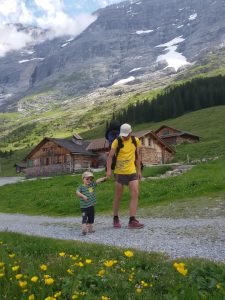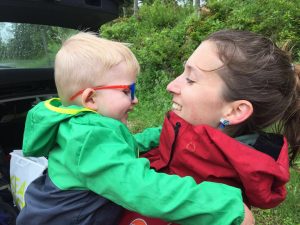Living With LCA: Enzo’s Story
Enzo was born in 2014 in Lausanne, Switzerland, with a clubfoot. He immediately received physical therapy, then a plaster cast for three months and one minor surgery.
His parents – Laura Steinbusch, a post-doctoral fellow researching the neuroscience of diabetes, and Merlijn Meens, a scientist investigating cardiovascular function – felt confident as they were reassured through medical literature and by doctors that in time their son’s left foot would be fine.
But there was more to come. At 3 months, as Enzo’s therapy for his foot progressed, something seemed wrong with his vision and his ability to focus. Doctors diagnosed him with nystagmus, a condition in which Enzo’s eyes involuntarily moved side to side.
An MRI showed normal brain development and then doctors did an electroretinogram (ERG), placing electrodes on his eyes to measure the electric response of their light-sensitive cells. Enzo also underwent Visual Evoked Potential (VEP) testing, a non-invasive exam that measures his entire vision system.
Doctors fitted Enzo with glasses at 6 months and said the ERG and VEP results needed further study.
Enzo began rubbing his eyes, prompting people to ask Laura whether her son was tired or shy. A few months later, doctors diagnosed 10-month-old Enzo with Leber congenital amaurosis.
‘He is still our cheerful son’
“While walking home from this last doctor’s appointment, we were in shock, but after a while we realized that Enzo had not changed. He was still our cheerful son that likes to sing and cuddle,” Laura wrote in her blog for the Eye Association of the Netherlands.
“We wondered how we could raise Enzo as normal as possible and how we could help him discover the world. The solution turned out to be simple: We will not despair and (will) come up with creative solutions so he can participate in everything that this world has to offer.”
That Christmas, Enzo’s parents designed their holiday in a way that greatly fostered their son’s vocabulary,  sensory and motor skills, exposing him to chickens on a farm, rocks and water at the beach and a mountain climb with a summit lunch of pancakes and omelets.
sensory and motor skills, exposing him to chickens on a farm, rocks and water at the beach and a mountain climb with a summit lunch of pancakes and omelets.
Also, for the first time he said, “Dad,” “Mom” and a version of his own name, “Echoo.”
Leber congenital amaurosis genetic diagnosis
Then, at 18 months, Enzo received the genetic diagnosis of LCA10-CEP290. LCA10 is a severe retinal dystrophy caused by mutations in the CEP290 gene.
Laura interviewed doctors about research on LCA10-CEP290, becoming an intense advocate and learning myriad facets of the genetics behind Enzo’s disease and the stakeholders at work to find a treatment.
With global health organizations headquartered in the Lake Geneva region, Laura attended conferences, including a recent policy event about “the right to health” organized by Rare Diseases International.
She learned that researchers in the International Rare Diseases Research Consortium are working toward their goal of all people living with rare disease to receive diagnosis, care and therapy within a year “of coming to subspecialty medical attention.”
“Big visions and great goals,” Laura wrote in her blog for wonderbaby.org. “It made me hopeful for a future with inclusive education for all our children, job possibilities for all our children, a quick diagnosis for new patients and maybe a treatment for improved vision.”
Singing, reading, taking the bus
At home, Laura and Merlijn initially did not have access to many Braille and tactile books for Enzo so they created their own. For instance, they brought to life a picture-book hedgehog by fashioning spines with nails and duct tape.
 Laura now is working on a multilingual children’s songbook with songs in English, French, Dutch and German. She got the idea because Enzo easily learned new words in French or English through songs, especially when he already knew the song in Dutch. Two Dutch foundations said they want to help pay for part of the project, but Laura is still searching for funding and she is reaching out to ask whether anyone knows of groups she can contact for help in the United States, United Kingdom, Canada or Australia.
Laura now is working on a multilingual children’s songbook with songs in English, French, Dutch and German. She got the idea because Enzo easily learned new words in French or English through songs, especially when he already knew the song in Dutch. Two Dutch foundations said they want to help pay for part of the project, but Laura is still searching for funding and she is reaching out to ask whether anyone knows of groups she can contact for help in the United States, United Kingdom, Canada or Australia.
Enzo just turned 3. He loves playing with other children at nursery school and he is learning to be more independent. Also, doctors successfully treated his foot, with Enzo’s mom adding, “It was probably harder on us than on him.”
In September, he and his parents moved from Switzerland to their homeland, the Netherlands.
“Enzo is doing very well,” Laura said. “He loves listening to music, singing, reading books, everything that has to do with movement. He adores taking the bus, the train, the metro, the cable car, a bike ride…
“One of his favorite sentences nowadays is ‘What is that?’ (something he heard) or ‘Who is that?’ (someone talking), meaning that he is really curious.”
Read more stories of families living with LCA on our blog.
Sign up for our newsletter to stay in touch with the LCA community.
